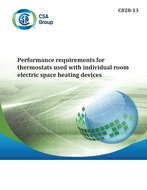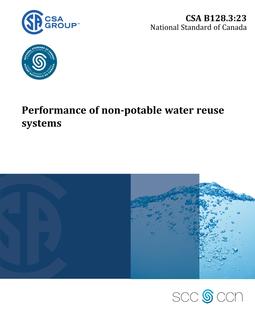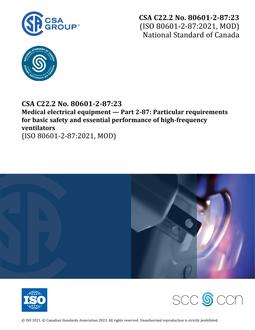
CSA C828-13 (R2018)
Click here to purchase
Preface
This is the third edition of CSA C828, Performance requirements for thermostats used with individual room electric space heating devices. It supersedes the previous editions published in 2006 and 1999.
This Standard deals with the thermal regulation and electromagnetic compatibility of thermostats used with individual room electric space heating devices.
Scope
1.1 General
This Standard specifies performance requirements for thermostat models intended for line-voltage (120 to 240 V) switching of a controlled resistive heating load.
The models covered by this Standard are as follows:
a) wall-mounted line-voltage thermostats used with baseboards, panel convectors, fan-forced heaters or radiant floors;
b) built-in line-voltage thermostats (up to 1500 W) used in baseboards, panel convectors or fan-forced heaters; and
c) two-component thermostats.
This Standard’s requirements apply only to local zone thermostats; they do not apply to central heating units under the control of a single thermostat and thermostats in portable heaters.
1.2 Thermostats not covered by this StandardThermostats used exclusively or built-in in the following units are excluded:
a) ceiling-mounted fan-forced heaters;
b) floor-mounted fan-forced;
c) kick space; and
d) fireplaces.
1.3 Thermal regulation and power line quality
This Standard specifies performance requirements covering thermal regulation and power line quality. The thermal regulation requirements are based on testing in a dual-climate test chamber. The power line quality requirements establish the level of emissions that might be generated by line-voltage thermostats and the extent of line-voltage thermostat susceptibility to electromagnetic disturbances that can be present on power lines.
1.4 Terminology
In CSA Standards, “shall” is used to express a requirement, i.e., a provision that the user is obliged to satisfy in order to comply with the standard; “should” is used to express a recommendation or that which is advised but not required; “may” is used to express an option or that which is permissible within the limits of the standard; and “can” is used to express possibility or capability.
Notes accompanying clauses do not include requirements or alternative requirements; the purpose of a note accompanying a clause is to separate from the text explanatory or informative material.
Notes to tables and figures are considered part of the table or figure and may be written as requirements.
Annexes are designated normative (mandatory) or informative (non-mandatory) to define their application.
1.5 Units of measurement
The values given in SI (metric) units are the standard. The values given in parentheses are for information only.
Product Details
- Edition:
- 3rd
- Published:
- 03/01/2013
- ISBN(s):
- 9781771390019
- Number of Pages:
- 28
- File Size:
- 1 file , 1.5 MB
- Product Code(s):
- 2421982, 2422573, 2421982


